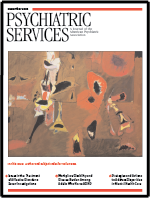Abstract
OBJECTIVES: Depression is most commonly treated in the primary care setting. However, most studies have shown that depression care in this setting is often inadequate. This study examined the adequacy of antidepressant treatment and overall depression management by primary care physicians and identified patient characteristics related to inadequate care. METHODS: Adequacy of depression care among patients with depression who presented to a primary care office was evaluated by using physicians' self-reports and medication prescription data. Adequacy of depression care was measured in two ways: adequacy of the current medication trial was measured by using the Antidepressant Treatment and History Form (ATHF), and adequacy of overall management by the physician was measured by using an algorithm developed for this study. The association was examined between patient characteristics and adequacy of the medication trial or depression management. RESULTS: Data were gathered for 389 patients with depression. Overall, 71 percent of patients had adequate ATHF scores, and 75 percent were judged to receive adequate depression management. No significant differences in adequacy were seen on the basis of race, age, or gender. When depressive symptoms were almost absent or extremely severe, 91 percent of patients were adequately managed; in contrast, when symptoms were mild, mild to moderate, or moderate 69 percent of patients were adequately managed. Additionally, specific medications, such as sertraline and fluoxetine, were associated with a lower likelihood of an adequate ATHF score. CONCLUSIONS: A majority of these primary care patients were adequately treated for depression, with no detectable disparity related to race or age. However, mild to moderate depressive symptoms (as opposed to remitted or severe symptoms) and specific medications were associated with a lower rate of adequacy. These findings have implications for ways that primary care physicians could be trained to more adequately manage the spectrum of severity of depression.



